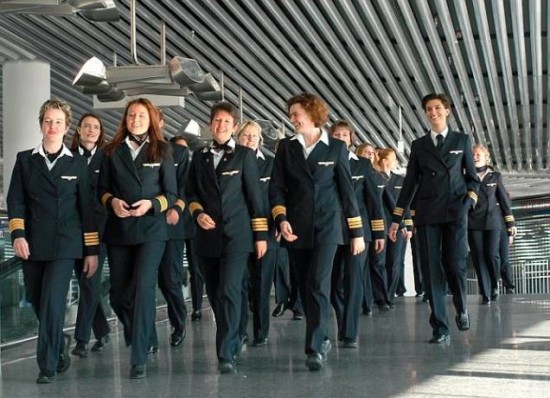
Female pilots of Lufthansa, photographed for the airline by Rolf Bewersdorf. Why aren’t there more of them? According to an article in Schweiz am Sonntag (via EMMA), there should be more women pilots, because they are actually the more trustworthy sex. And more to the point, according to a leading Swiss expert on suicide, it’s because they are more in control of themselves emotionally speaking, and less likely to commit suicide on the job:
As a pilot, train engineer or bus driver, the responsibility is huge, because passengers trust them with their lives. Above all, men hold these positions. Of Swissair’s 1,341 pilots, only 59 are women. A similar gender relationship shows itself in SBB (Swiss rail) and the Postbus: of 3,500 train engineers, 80 are women, and of 3,079 Postbus drivers, 245 are women.
Gabriela Stoppe regards this share as much too low. She is a psychiatrist and vice-president of Ipsilon, the umbrella organization for suicide prevention in Switzerland.
“It would make sense not only for diversity, but for safety, to have more women in human transport,” says Stoppe. She bases her statement on the fact that women have lower rates of suicide. “It was only a matter of time that a pilot would commit suicide with an airplane in Europe, too.”
As unbelievable as the case of the Germanwings crash may be, in the past decades there have been several crashes in which pilots killed themselves with their planes. Six are documented.
In Switzerland, suicide is the number one cause of death for men between the ages of 14 and 44. In 2012, 240 of them took their lives. Although the number of self-inflicted deaths has gone down a bit in the last ten years, three times as many men as women take their own lives still. “This should be taken into account in choosing a pilot, driver or engineer,” says Stoppe.
On Tuesday at 10:30 a.m., co-pilot Andreas L., 27, begins the descent over the French Alps. The Germanwings Airbus A320 rapidly loses altitude. The captain is locked out of the cockpit, he can’t do anything anymore. After eight minutes the plane crashes. All 150 persons die.
“Many signs point to a take-along suicide,” says Stoppe. A rare form of suicide. “Often it’s fathers or mothers, who don’t only kill themselves, but also their children and their partners. That someone would take several passengers along is unusual.”
The psychiatrist imagines it went like this: When Andreas L. got the opportunity to put his thoughts into realization, he shut down mentally and emotionally. In the moment of a suicidal crisis, people only have tunnel vision. And as with rampage-runners, there is no way back.
The Düsseldorf police don’t find a suicide note during their search of Andreas L.’s apartment. But they do find torn-up doctors’ notes, current, and even dated the day of the crash, as well as several medications for the treatment of psychiatric illnesses. The co-pilot also suffered from vision problems. The investigators conclude “that the deceased hid his illness from his employer and co-workers.”
This doesn’t surprise Gabriela Stoppe. “Precisely those people who fear that they will lose their job due to a mental illness don’t dare speak of it.” Often, such people will also refuse to take medication, so as not to be detected during drug testing. “Depression and other mental illnesses are, as ever, a taboo in certain professions and careers.” That leads to only about 60% of those affected reporting such illnesses. “Meanwhile, 80 to 90% of such cases would be successfully treatable.”
Nowadays, the airline doctor checks the mental health of pilots during their aptitude tests. Yearly medical checkups follow. A similar procedure takes place with railroad and bus drivers. Bus-driver candidates are tested mainly for resiliency, observational capacities, and also for aggressive tendencies, while locomotive engineers are tested for how well they handle solitude and repetitive tasks.
That alone won’t do, Gabriela Stoppe is convinced. Psychological testing is still necessary in later career phases. And particularly from doctors trained in psychiatry. “Highly intelligent people are particularly likely to conceal such serious problems as paranoid hallucinatory psychoses,” says a Munich psychiatrist, Helmut Kolitzus, in Der Spiegel.
Swissair is currently debating whether to psychologically test their pilots once a year.
Translation mine.
No word on what Lufthansa’s current psychological testing policies are, or how they’ll change, but the fact that Swissair sees a need to change theirs is telling. As is the fact that Andreas L. had several torn-up doctor’s notes in his wastebasket. Clearly not a company doctor, because he was expected to take those notes to his supervisor himself, and he didn’t. Maybe Lufthansa/Germanwings needs to employ a company shrink, one who reports directly to supervisors of the pilots if there is any problem? Because in this case, the patient was trusted to do the appropriate thing…and because he was clearly fearful of losing his dream job, the only one he ever wanted, he chose instead to conceal his condition until it was too late. 150 people paid with the senseless loss of their lives for the unwillingness of one to step back for his mental health’s sake.
But why would more female pilots be an answer to problems like that? Simple: Because while women are more likely to be depressive, and also more likely to attempt suicide than men, they are also less likely to actually die that way. They tend to choose less violent methods, ones which are more readily reversed: an overdose of pills, say, instead of a gun or a vehicle crash. A female suicide attempt is not a melodramatic “bid for attention”, as it’s often dismissed as being; rather, it’s a last, desperate cry for help. And for that reason, a woman who tries to take her own life is more likely to get help, in the end — simply because her suicide method is less likely to “succeed”.
Men, on the other hand, ironically succeed at killing themselves because they are socialized from infancy up to be more aggressive — and by that token, “successful”. They are taught to pursue what they want at any cost, even if it’s unreasonable — eg., a career as a commercial pilot when they are too emotionally labile to handle the stresses — or if it’s death. Extreme behavior is less frowned upon in a boy than a girl, and less so in a man than in a woman, as well. Risk-taking is more praised in males than in females. If a man is violent, “boys will be boys” is the excuse most likely to be waved around.
Should a woman do the same, however, suddenly it’s “bitches be crazy”.
This is all in line with popular stereotypes. A boy with “leadership attributes” is lionized; a girl with the same attributes is hand-waved off as “bossy”. Little wonder, then, that the transport industry is dominated by male drivers, engineers and pilots. It’s not that women can’t work a set of controls (one doesn’t have to be bigger or stronger or endowed with a penis to grasp a steering wheel, after all); it’s that women are more likely to be discouraged from an early age of even thinking of entering those jobs. Because they’re not “mentally fit” for them. Because “hormones”. Never mind that the worst case of PMS doesn’t turn a woman into a deranged psychopath; at most, it puts her bullshit-tolerance on a par with that of the average man, whose hormone levels of course are never blamed for anything. No, bitchez be the crazy ones. Cray-cray-ba-nay-nay.
It is time to stop gaslighting girls out of careers in the transport industry. Because one of our best attributes, ironically, is the very one that’s been used to deny us piloting jobs in the past: yup, our ever-fluctuating, blameworthy hormones. We’re so good at riding out those little physical ups and downs, it actually makes us more mentally stable, not less. We become more careful and more conscientious as a result. And we are more likely to seek help if we need it, too. Female pilots, to date, have caused 0 (count ’em, ZERO) suicide crashes. Surely that’s a significant statistic right there. Why doesn’t the industry seize on that, and recruit more female pilots?
To “fight like a girl” to keep a job one loves means to take a break if one needs it, and return to work later…instead of doing the type-A macho thing and hiding one’s problems until suddenly the plane is in a death dive, and there is no turning back.



